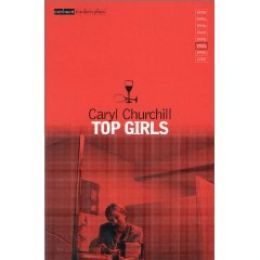 When it comes to reading, I haven’t really given much thought to plays other than some of Shakespeare’s work I’ve read in school. I’m not really sure why it hasn’t occurred to me to read more plays but it’s never too late to explore the notion.
When it comes to reading, I haven’t really given much thought to plays other than some of Shakespeare’s work I’ve read in school. I’m not really sure why it hasn’t occurred to me to read more plays but it’s never too late to explore the notion.
I have just finished reading Top Girls by Caryl Churchill first published in 1982. It comprises of three acts with Marlene at its centre; a career oriented, overambitious woman, a firm believer in female strength and intelligence and a representative of gender equality. She rejects the idea of the passive woman or what is perceived to be the ‘good girl’. An idea that has become very reflective of what a man expects of the ‘gentler sex’. The submissive role is represented by her sister Joyce.
The play is very multilayered and is, in essence, a commentary about what success really means to a woman. Churchill doesn’t make a point of giving a definitive answer but leaves her reader/audience member to question what it is.
The first act serves as a prologue to Marlene’s ideals and way of life. Churchill introduces us to five women of history from different periods of time from various corners of the world all of whom represent the female gender in a way that is not accepted by their society. These women have all gathered to celebrate Marlene’s recent promotion to the top position at an employment agency. These female characters are: Pope Joan from the 19th Century; An emperor’s concubine turned Buddhist nun named Lady Ninjo; Isabella Bird an explorer from Victorian times; Dull Gret a subject in Bruegel’s 16th Century painting; and lastly, patient Griselda, the only house-wife amongst the characters, the stereotypical product of male thought. Not only do their conversations detail their life experiences, but also question the structures of the male oriented patriarchal societies in which they lived in. the question remains: Has the female image really changed over time?
Act II moves us into Marlene’s work space where conversations are taking place as she is settling into her first day working her top job’. The most significant conversation in this act is between Marlene herself and a co-worker’s wife who storms into the office asking her to step down so that her husband can take over. He is sick at home having difficulty dealing with the idea of 1) Having lost the position to a woman and 2) Having to go back to work under her direction and observation. His wife comments: “What’s it going to do him working for a woman? I think if it was a man he’d get over with it as something normal.”
In Act III, we are given more insight into Marlene’s personal life by visiting her submissive sister’s place, observing her interactions with her ‘daughter’ who we later learn to be Marlene’s biological child and listening in on their conversations detailing Marlene’s sacrifices that have lead her to achieving success, or to be taken seriously, in a male dominant environment which turn out to be quite costly especially when it comes to personal/emotional sacrifice. There didn’t really seem to be a definitive beginning, middle and end to this play… at least I didn’t think so. It seemed to be more of a glimpse into the life of Marlene rather than her entire life story. The focus was set on the commentary of what she stood for as a woman and less so of the details of her failure as a mother or the specifics of how she got her ‘top job’. The point is she did and what did others and herself think about the achievement and her ideas that got her there.
The play itself would be played entirely by women very much representing and reflecting the female voice. The style of writing or “chitter-chatter”, if you will, of the lines were a challenge to keep up with at the start… very much like listening to several conversations at once and not quite knowing which to join. I can imagine it would be quite a challenge for stage actors and directors to orchestrate showing a natural flow to the simultaneous conversation.
However, the questions remain: Is breaking away from rigid social tradition worth it at the end of the day? Is society being more accepting to those who do liberate themselves from what is deemed ‘normal’? And at the same time, hasn’t Marlene herself used her sister unfairly in order to get to where she is now? Has she assumed the role of a dominant male? What of that?
